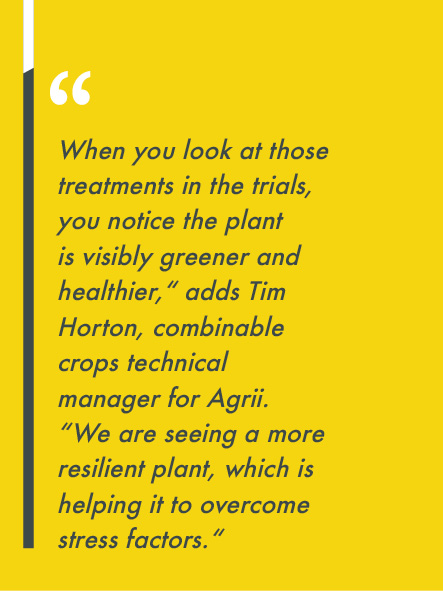A new class of biostimulant energises the plant’s metabolic processes to fight off pathogens by triggering a hypersensitive response. It looks set to find its way into early-season spray programmes this spring.

A new type of biostimulant has emerged that works hand-in-hand with conventional crop protection programmes by boosting plant health to help combat disease threats. These stimulate metabolic processes linked to fighting off pathogens, such as when humans take vitamins to fight a cold.
Agrii has been trialling one of these products across a range of crops, and the team is excited by its potential, explains Jodie Littleford, Agrii technical manager for combinable crop trials.
Called Innocul8, the active ingredient is PHC101, which is a peptide. This is combined with manganese and zinc, both crucial components in many plant enzymes.
“We are quite familiar with what amino acids are,“ says Jodie. “They are the individual building blocks that go on to form more complex structures like proteins. The plant can utilise them in whatever way it needs.
“Peptides are a step on from that. They’re strings of amino acids designed for specific purposes. They are far more targeted within the plant.“
Like a flu vaccine in humans, peptides trigger a hypersensitive response within plants. This is well-researched and documented in scientific literature, which was first published in the early 1990s.
Innocul8 sets off an immune response by being designed to mimic the effects of a pathogen damaging nearby cell walls. This then stimulates metabolic pathways synonymous with the plant defending itself from a pathogen attack, explains Jodie.
Jodie has been examining Inocul8 in wheat trials to determine the best time to apply the biostimulant and whether variety disease resistance is a factor. Due to its role in stimulating the plant’s metabolic processes, she has mainly focused on early spring timings, at or before T0.
“We tended to see a significant response of almost a third of a tonne per hectare (0.34 t/ Ha) if we applied Innocul8 early in the season, pre-T0, to trigger the hypersensitive response before disease onset,“ says Jodie.

“When you look at those treatments in the trials, you notice the plant is visibly greener and healthier,“ adds Tim Horton, combinable crops technical manager for Agrii. “We are seeing a more resilient plant, which is helping it to overcome stress factors.“
Results show that there is flexibility in when Innocul8 can be applied to the crop without compromising its plant health effects. This is a bonus for farmers who often have a queue of jobs for their sprayers in February and March.
“The great advantage with a product like Innocul8 is that you are switching on the plant’s metabolic responses, so you don’t have to aim for a particular leaf layer. Once you have the response from the plant, you have achieved your aim,“ explains Tim.
Additionally, Tim says that they have not experienced any issues with tank mix compatibility, meaning farmers could opt to include it with their spring grass weed sprays.
“We haven’t found anything it won’t mix with, so we are quite happy to include it within any tank mix,“ he says.
Last spring, Agrii agronomist Peter Gould recommended Innocul8. He is based on the south coast where milling wheats dominate the variety mix.
“We principally used it in KWS Palladium because it is a variety with a good disease package,“ says Peter. “Innocul8 was applied as a pre-T0. We then missed out the T0 fungicide, did a reduced rate T1, and hit it hard at T2 with Inatreq (fenpicoxamid).“
“It fitted in very well when we were going through with Pacifica (mesosulfuron, iodosulfuron) or Avocet (pyroxsulam) to tidy up bromes and other grassweeds.“
Peter echoes Tim’s thoughts regarding Innocul8’s tank mix compatibility. He saw no issues when it was included in tank mixes, and grass weed control wasn’t compromised. Indeed, Peter adds that the timing for contact graminicides was well-suited to when he planned to apply Innocul8 at pre-T0.
For more information on this article or Innocul8,
please email info@agrii.co.uk



